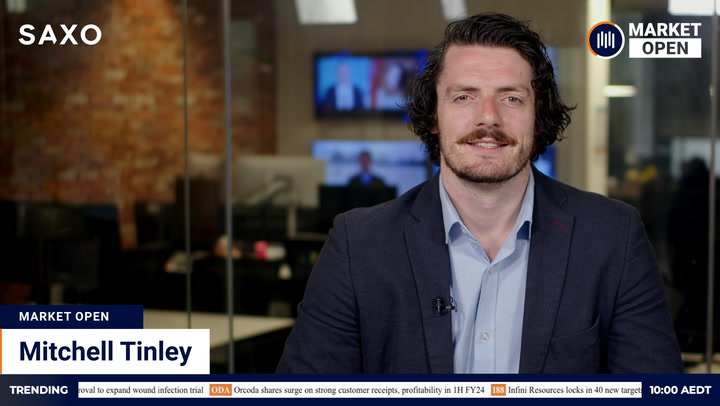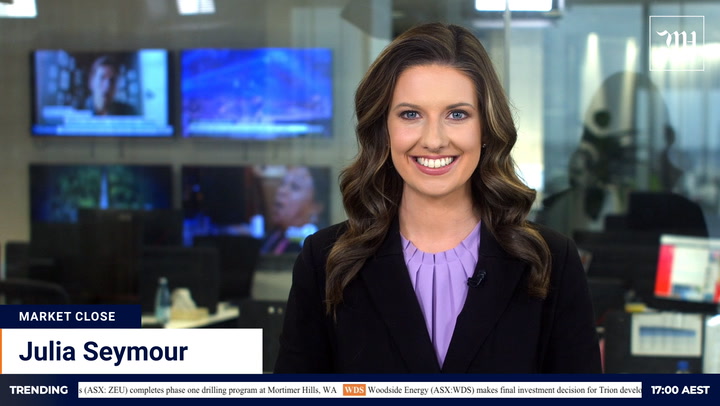The Australian trading week looked set for a bright start following a strong rebound in US technology stocks and ‘reopening trades’.
ASX futures rallied 48 points or 0.69 per cent, pointing to a second day of gains. The S&P/ASX 200 bounced 32 points or 0.45 per cent on Friday to trim the index’s loss for the week to around 0.9 per cent.
Wall Street
A see-saw week in the US ended with a sharp up-swing, erasing much of the losses through the first half of the week. The S&P 500 climbed 61 points or 1.49 per cent. The Dow Jones Industrial Average rose 361 points or 1.06 per cent. The Nasdaq Composite gained 305 points or 2.32 per cent.
The rebound cut the S&P 500’s loss for the week to 1.4 per cent. By Wednesday, the index had fallen 4 per cent in three sessions amid fears soaring inflation left the market looking overvalued. The Dow pared a mid-week loss of 1,200 points to less than 400 points or 1.1 per cent. The Nasdaq reduced its decline from around 5 per cent to 2.3 per cent.
“This week’s decline was a good thing,” Tony Dwyer, chief market strategist at Canaccord Genuity, said. “There needs to be a correction into the [northern] summer that is meaningful enough to eliminate the extreme intermediate-term overbought condition and excess optimism.”
Battered tech heavyweights shone for a second session. Facebook gained 3.5 per cent, Tesla 3.16 per cent, Microsoft 2.11 per cent and Apple 1.98 per cent. ‘Big Tech’ bore the brunt of the selling through the first half of the week as institutional investors adjusted valuations to reflect the impact of higher input costs from rising inflation and commodity prices.
Reopening plays gained momentum after the Centers for Disease Control and Prevention (CDC) relaxed its Covid advice. The US public health agency said fully-vaccinated Americans need no longer wear masks or stay six feet from others in most situations.
The S&P 1500 airlines index jumped 4.66 per cent. United Airlines gained 5.44 per cent and American Airlines 5.61 per cent. Cruise lines Carnival and Norwegian advanced 8.28 and 8.09 per cent, respectively. Hyatt Hotels put on 3.57 per cent
Data on Friday showed consumer spending slowed last month as the short-term hit from stimulus cheques faded. Advance retail sales were flat, cooling fears about an overheating economy.
“This is one more report that throws cold water on notions of the Federal Reserve tightening US monetary policy anytime soon,” Jim Wyckoff, senior analyst at Kitco.com, wrote.
“Stimulus checks were mostly used up in March spending, but households now hold larger savings than they did pre-pandemic,” Yelena Maleyev, economist at Grant Thornton, said. “New CDC guidance saying that vaccinated people no longer need to wear masks, added to more states reopening in May, will lead to more consumer activity during the spring and summer months,” she added.
Australian outlook
Broadly positive leads suggest a strong start to the week. The latest inflation scare continued to fade in the US on Friday, although the major indices did not quite recoup their losses for the week.
All 11 US sectors advanced, led by energy +3.16 per cent and technology +2.12 per cent. The financial sector put on 1.54 per cent and industrials 1.34 per cent.
US materials gained 1.19 per cent. However, a sharp decline in iron ore makes it extremely unlikely the domestic sector will match that performance. Iron ore reversed 10.2 per cent on Friday (more below).
Covid appears to be back under control in NSW. Social distancing rules in Greater Sydney were set to be relaxed today. A greater threat to risk appetite might be the deteriorating situation in the Middle East. Escalating hostilities between Israel and the Palestinian Territories threaten the stability of crude markets, in particular. Any upswing in energy prices would add to concerns about inflation.
The April employment report is this week’s big-ticket item on the economic calendar. The report on Thursday is not expected to continue the post-lockdown trend towards big numbers and sharp falls in the jobless rate. The consensus among economists is for growth of around 20,000 and for unemployment to hold steady at 5.6 per cent.
With inflation fears dominating the trading landscape, Wednesday’s quarterly wage price index is another potential market-mover. Also this week: the minutes from this month’s RBA policy meeting (Tuesday); April consumer sentiment (Wednesday); inflation expectations (Thursday); and retail sales and flash manufacturing and services PMIs (Friday).
Noon today AEST brings a slew of Chinese economic data. Growth in industrial production and retail sales is expected to taper following a post-lockdown bounce from very low benchmarks.
The IPO pipeline continues to run hot. Expected to list this week are: Audeara (Tuesday – delayed from last week); Lithium Energy (Wednesday); and Flynn Gold (Thursday).
Elders and Incitec Pivot release half-year results today. Webjet releases full-year results on Wednesday. Nufarm follows with interim results on Thursday. AGMs this week include Sydney Airport, Adbri, Eagers and G8 Education. Macquarie Group goes ex-dividend today.
The dollar rebounded on Friday as risk appetite improved. The Aussie opened flat this morning at 77.71 US cents after trading as low as 76.88 cents last week.
Commodities
Iron ore tumbled on Friday after prices went parabolic earlier in the week. The spot price for iron ore landed in China dived $23.75 or 10.2 per cent to US$209.35 a tonne.
Ore prices hit all-time highs on Wednesday around US$230 a tonne, prompting Chinese authorities to wade in. Prices reversed after regulators reportedly warned steel-makers about price gouging and collusion.
The short-term impact on ore giants BHP and Rio Tinto was minimal. BHP’s US-listed stock dropped 0.26 per cent and its UK-listed stock lost 1.29 per cent. Rio Tinto shed 1.99 per cent in the US and 2.68 per cent in the UK.
Copper continued to retreat from Monday’s record high. Benchmark copper on the London Metal Exchange eased 1.1 per cent to US$10,214.50 a tonne. Nickel gained 1.3 per cent, lead 0.3 per cent, zinc 0.5 per cent and tin 0.8 per cent. Aluminium was unchanged.
Oil shrugged off the reopening of a key US fuel pipeline following a ransomware attack. Brent crude settled $1.66 or 2.5 per cent higher at US$68.71 a barrel. The closure of the 5,500-mile Colonial Pipeline lifted prices earlier in the week as shortages forced many fuel stations on the US east coast to close.
Gold rose for a second night to its strongest close since February. Metal for June delivery settled $14.10 or 0.8 per cent ahead at US$1,838.10 an ounce. The NYSE Arca Gold Bugs Index climbed 3.08 per cent.







